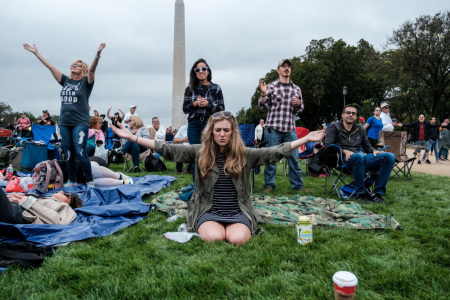Most Americans consider religion fundamental to one's identity; back freedom to exercise beliefs

Most Americans back religious freedom as they agree that religion is a "fundamental part" of people, a recent survey by the Becket Fund for Religious Liberty found.
Sixty percent of Americans said that "religion, for some people, is a fundamental part of 'who I am' and should be protected accordingly."
A majority of the 1,000 respondents across the United States also agreed that religious freedom and exercise are inherently public and extend to school, work, social media and other places. Generation Z and black respondents supported this belief most strongly, the survey found.
"Data from the Index and additional questions show support for the idea that religion is part of an individual’s identity, not just a hobby or a weekend activity," the survey noted.
Most Americans said that even when accommodating religion in the workplace causes an inconvenience or imposition for others, religious freedom should win out.
Overall, the survey found that support for religious freedom decreased slightly from the previous year. On a scale of 0 to 100 (100 being robust support), this year’s index score is 66, down from 67. More specifically, the score for religious pluralism (basic rights to hold beliefs and live out the basic tenets of that religion in their daily life) went down from 80 to 77; for religion sharing (free to share their beliefs with others) the score decreased from 71 to 69; and for church and state (boundaries of interactions between government and religion), the score is 56, down two points from last year.
The only area that didn’t see a fall in support was religion in action (being free to practice beliefs beyond the walls of homes or places of worship) with a score of 65.
With the outbreak of the COVID-19 pandemic this year, the survey also measured attitudes related to restrictions on religious gatherings.
“Seeing religion as an identity also helps explain views on religious worship during the pandemic. State and local governments across the country walked into lawsuits brought by religious plaintiffs when they failed to treat houses of worship and religious schools equally in their pandemic reopening policies,” reads the survey.
Among survey respondents, 79% said that houses of worship should receive the same or higher priority compared to businesses for COVID-19 reopenings. Respondents were even more in favor of prioritizing outdoor worship services before outdoor protests.
But many churches have argued that politicians have been putting businesses and protests before churches. In Nevada, Gov. Steve Sisolak had imposed a 50-person cap on church attendance while leaving casinos able to operate at 50% capacity over the summer. In New York, Governor Andrew Cuomo recently imposed a 10-person limit on churches and synagogues in COVID-19 hotspots, while grocery stores and pet shops could operate with less restriction. The Supreme Court ruled to temporarily block Cuomo’s restrictions, saying that the churches are likely to succeed in their arguments that the restrictions violate the First Amendment.
Other findings from the survey showed that how political candidates feel about religious liberty is important to most voters (78%). The position of a political candidate on religious freedom matters more than the religion of the candidate. Only 45% of voters said they were influenced by the faith of their candidates.
Survey respondents were also most likely to say that among the branches of government, the courts (27%) do the best job in protecting religious freedom and least likely to name Congress (15%).





















